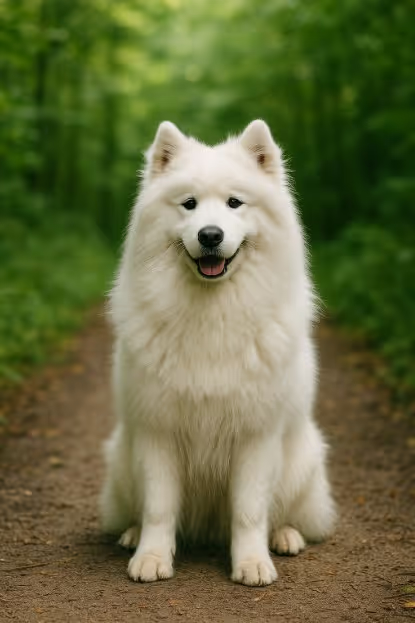The Samoyed is a striking, gentle, and affectionate working breed known for its beautiful white “smiling” face, luxurious double coat, and warm, friendly personality. Originally bred by the nomadic Samoyedic people of Siberia to herd reindeer, pull sleds, and keep their families warm at night, Samoyeds are loyal, social, and full of energy. They thrive in active homes that can provide companionship, daily exercise, and regular grooming.

The Samoyed’s origins trace back thousands of years to the Samoyedic people of Siberia, who developed the breed to assist in daily survival. These dogs herded reindeer, pulled sleds across icy terrain, and even slept alongside their owners for warmth during freezing nights. The Samoyed’s friendly and cooperative nature was essential for close living conditions. They were introduced to Europe and North America in the late 19th century, gaining recognition for their work in Arctic expeditions. Today, they remain a beloved companion and working dog, celebrated for their beauty and temperament.
A medium to large spitz-type dog with a plush white double coat and signature “Sammy smile.”
High grooming needs to maintain coat health and manage shedding.
Active, high-energy working breed requiring daily activity.
Intelligent and eager to please but can be strong-willed.
Balanced diet supports their energy needs and coat health.
Generally healthy but may be prone to some hereditary conditions.
Available through reputable breeders and northern breed rescues.
Are Samoyeds good family dogs?
Yes, they are gentle, affectionate, and great with children.
Do they bark a lot?
Yes, they are vocal and may bark when excited or alerting.
Do they shed much?
Yes, heavily, especially during seasonal coat changes.
Are they easy to train?
Yes, with patience and consistent positive methods.
Do they get along with other pets?
Yes, with socialization, they are friendly toward other animals.
Are they hypoallergenic?
No.
How much exercise do they need?
At least 60–90 minutes daily.